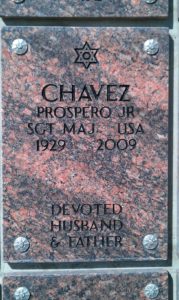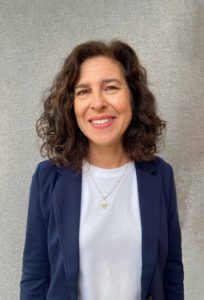
| Photo by Keith Chavez
“Shabbat Shalom a Todos” wrote one member in the “Sephardic and Crypto-Jewish Research” Facebook group to an audience of more than 400 members, many of whom live in northern Mexico or the United States Southwest.
The post is nestled above a query to find a book on Spanish marine and navy guards published in 1954 in Madrid and below a posting of an old textbook image showing a woman facing the Inquisition in Mexico City.
The contents of the posts to the group run the gamut, but all pertain to crypto-Judaism, the secret practice of Judaism by Sephardic Jews in Spain and its colonies during, and after, the Inquisition.
In a time where Catholics remain the vast majority in Spanish-speaking countries and in Iberia, Jewish people in these countries remain stigmatized, though the Inquisition ended centuries ago. It’s why these Facebook groups are precious to so many people just now uncovering their Sephardic backgrounds after generations of it being hidden from them.
Philadelphia local Ronit Treatman is a member of more than 25 of these groups, including “Sephardic and Crypto-Jewish Research.”
In 2012, Treatman found out about her own background through DNA testing: A surprise finding indicated that family members had moved to Poland from Spain.
“It showed that part of them were forced to convert and had to go to Brazil,” Treatman said.
The uncovering of one’s Jewish backstory, particularly finding out about having crypto-Jewish ancestors, has become more common in the age of accessible DNA testing, Treatman said. Companies such as Family Tree DNA can look more specifically at Sephardic roots.
Treatman describes herself as “the other side of the mirror.” While so many other members from the groups are raised Catholic and are just now trying to learn more about their Jewish roots, Treatman has always known she was Jewish (Her father was an Israeli diplomat).
After almost a decade of networking in these groups, she’s been able to assist scores of people in finding texts, resources and community members to connect these crypto-Jewish descendants back to Judaism.
Philadelphia Jews are no strangers to helping descendants of crypto-Jews, also called Conversos, Bnei Anusim or Marranos — the Spanish word for “pig,” which Treatman finds an unfit terminology for the group.

Congregation Mikveh Israel, the oldest synagogue in Philadelphia, was founded by Spanish and Portuguese Jews by way of a Sephardic synagogue in Amsterdam.
In the 1920s, it was the first Sephardic synagogue to respond to the requests of the Portuguese Marranos Committee, “for funds to be expended in reclaiming to Judaism more than 14,000 Marranos, who have been living in Portugal, openly as Christians and secretly as Jews for over four centuries,” wrote Mikveh Israel religious leader Leon H. Elmalah in an Oct. 31, 1926 letter.
The appeal was made in partnership with the Sephardic Community of London, the Anglo Jewish Association and the Alliance Israelite, the letter explained. The donation made by Mikveh Israel would be worth $50,000 today, Mikveh Israel Rabbi Albert Gabbai said.
“Since we are a Spanish and Portuguese synagogue, and we trace our ancestry to the Jews who escaped — because we are a congregation that follows this tradition started by these Jews, it was a natural address for us to help them out,” Gabbai said.
Gabbai visited the Portuguese Jewish community, which now numbers between 50 and 100, in 2017, decades after it received a Jewish education from Israeli rabbis sent to teach about Jewish holidays.
The trip was heartening, Gabbai said, as he was able to see what Mikveh Israel’s assistance 90 years prior was able to do. But misconceptions around Jews in the area persist, he said.
On the trip, Gabbai witnessed a tourist at a church — erected in the place of an old synagogue — who asked what had happened to the Jews who left the synagogue.
“The guide said, ‘We invited them to leave the country,’” Gabbai said.
The continued stigma reaffirms Treatman’s work, she said. It has also driven the work of a friend of Treatman’s, whom she met in one crypto-Jewish Facebook event: Keith Chavez, an Albuquerque, New Mexico, native who found out he was Jewish at age 13.
“My great-grandmother was dying. She was bedridden for a length of time before she passed away, and she wanted to talk to me, my brother and my cousin,” Chavez said. “So she called us together. She said, ‘Somos Sefarditos.’ We are Sefarditos.”
In hindsight, Chavez’s Jewish background made sense to him, despite attending a Catholic church with his father growing up. While most every Catholic woman in New Mexico would sweep dust out their front doors, his great-grandmother used a dustpan, as sweeping outside one’s door violated the laws of a mezuzah (though the family never had mezuzahs on their doorposts). She insisted upon having her meat for weekend meals sourced and prepared in a way that resembled kosher law.
Chavez’s story resembles those of many other crypto-Jewish descendants, but he still considers himself different.
So many other people with crypto-Jewish backgrounds have staunchly denied their family backgrounds, instead favoring their Catholic upbringings. If they do choose to pursue learning more about Judaism, they can face scrutiny from some Jewish leaders who don’t consider crypto-Jewish descendants to be valid Jews without conversion.
Now an adjunct history and anthropology professor at the University of New Mexico, Chavez has taught about the presence of crypto-Jewish descendants in the Southwest U.S. and their own Inquisition, which only ended in the 19th century.
Like Treatman, Chavez is the administrator of a handful of crypto-Jewish Facebook groups. Facebook has helped change the landscape for crypto-Jewish descendants looking to connect, Chavez said, though these connections remain fewer than he hopes.
At one point, he helped a Finnish woman, who just found out about her Jewish ancestry, connect with a rabbi in Helsinki. The rabbi eventually led her through the conversion process.
“That I felt good about,” Chavez said. “Because she came home.”
[email protected]; 215-832-0741



